"Clean as crystal ..."
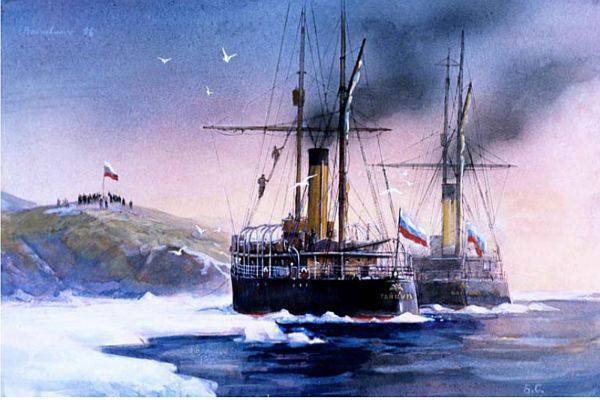
A MEETING. 100 YEARS BACK
In the middle of September, 1915, Arkhangelsk was waiting for the arrival of two icebreaking transports from the Arctic - "Taimyr" and "Vaigach" were returning from an expedition that discovered new lands in the Arctic Ocean. This is how the Northern Morning Arkhangelsk newspaper described their meeting: “It is a northern overcast day. In the morning it is raining, but by 10 the embankment near the Cathedral pier begins to fill with people.
The Arkhangelsk raid, despite the autumn, looks like a kindly affable, a mass of sailing ships and steamboats, decorated with flags in the morning.
Suitable groups of students, which are lined with tapestries on the pier. Arrives provincial military and civil authorities, representatives of the city and various public organizations.
Waiting minutes last for a long time. In 11 hours, a notice is transmitted by telephone that the vessels have already passed in Maimaks past the Amosov plant. The public peers in the distance.
Finally, the long-awaited expedition is shown. The yacht club ships are the first to welcome dear guests. Closer and closer to the Cathedral pier. Gunfire is heard - it is [military transport] "Bakan" says hello to the valiant sailors, receiving an immediate response salute. Here the team of “Bakan” crumbled over the guys, and the mighty “hurray” announces the Arkhangelsk raid.
First goes to the pier "Taimyr", followed by "Vaigach" and "Eclipse". The national anthem, performed by the orchestra, is heard, and the incessant "cheers" rolls over the rows. Bright joy, full of face, pride in domestic heroes "1.
Headed the Hydrographic Expedition of the Arctic Ocean 30-year-old Boris Vilkitsky. In a month, it will be disbanded, and many of its members will go to the fronts of the First World War and the Civil War, others will be emigrated ...
But while Vilkitsky is firmly on the bridge of "Taimyr" and peers into a bright future - and their own, and their ships, and Russia.
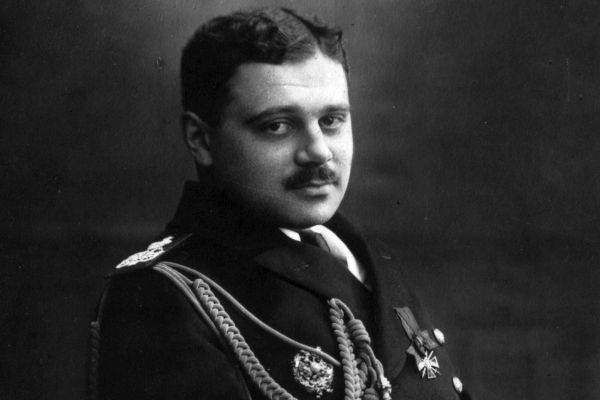
FATHER. REQUEST FOR "BOBOCHKU"
He was born 9 March 1885 year 2 and was the second child in the family of the outstanding hydrograph Andrei Ippolitovich Vilkitsky (1858-1913), polar explorer, creator and first head of the Main Hydrographic Department. A contemporary said a bit sparingly about his character: “He didn’t know how to save his strength.” 3. The father dreamed that the son would follow his path.
September 1 Boris Vilkitsky’s 1897 was accepted as a graduate of the Naval Cadet Corps. Captain 1 rank D.I. Daragan recalled: “It was an adorable, capricious child, a darling of fortune, terribly talented, with brilliant but usually unexplored projects. Bobochka was a sweet, interesting conversationalist, with a childish open look and impetuous movements, sometimes reminiscent of a good St. Bernard. He always studied poorly, he didn’t have to do it, but he didn’t need it, everything somehow was given to him. Very often, the strict "general" [V.P. Vilkitskaya] came to the body techniques to look at his darling, and with her two extremely beautiful are young Vilkitsky's elder sisters were so good that some midshipmen penetrated illegally to the reception, only to have a sidelong look at these young ladies, and when the exams arrived, these same sisters sat above Bobochka and made him read the relevant subjects at least once "4 .
But the father saw the main thing in his son. Shortly before his son was released, Vilkitsky Sr. wrote to the captain of the 1 rank IK. Grigorovich, the future maritime minister who then commanded the squadron battleship Tsesarevich: "Dear Ivan Konstantinovich! Back in 1898, when my son was in the younger company of M [Orsky] K [orpus], I expressed my sincere wish that my son I started my service under your superiors. In May, he will be released, and I dare to ask you to arrange it for me. A young man he is capable, secular and at the same time working. He walked for many years with 1 and only now 4- although his average score is greater than 11,5, he has He’s still very young, on the day of graduation he will be 18 years and 2 months. This is what makes me especially [inaudible] want him to start his service under your command, since in such years, the officer needs not only to make a real naval officer out of him, but also to continue educating other parties to him, and I know that in you he will find such a leader and receive from you all that I would like so that he owned. His dreams are to be a junior navigator, as in this science he is very strong and loves her. I will tell you frankly that if you don’t take him to yourself, I’ll no longer ask any of the commanders, even if he is satisfied with his own destiny, because I only see in you a combination of rare internal and external virtues that satisfies my ideas What should be a naval officer "5.
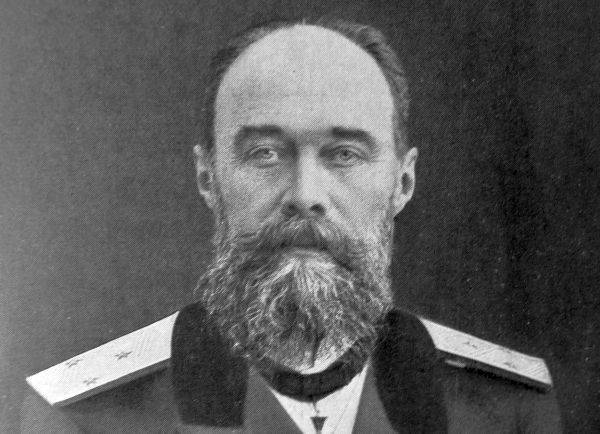
PORT-ARTHUR. CONFLICT WITH GUARDIAN
Grigorovich heeded the request and took Vilkitsky Junior under guardianship. He "thanked" him in full accordance with his character. March 28 1904, Grigorovich was fired as a rear admiral and appointed commander of Port Arthur. In June, Boris became his adjutant, but soon, according to the recollections of the same DI Daragan, “Bobka Vilkitsky scolded Grigorovich, left his dugouts at dacha places and went to war” 6.
What caused the conflict is unknown. Most likely, the patron sought to protect the young man from enemy bullets.
Nevertheless, Grigorovich paid tribute to the young officer: "The knowledge of the naval and military service is excellent. The main thing is that you can see the love of service and curiosity. He was such when he sailed with me on the Tsarevich, and remained the same as an adjutant. Possesses perseverance and courage during the fire, the carcass under fire fires. A little hot. It is necessary to sail on the combat ship "7.
During the fourth assault of Port-Arthur by the Japanese from 14 to 22 in November, fierce battles were fought over High Mountain. In the official stories The Russian-Japanese war on the sea states that November 18 "came to High Mountain, finally, a long-tried silence: this silence, however, was not complete, as the Japanese constantly continued to bombard the mountains with their siege artillery."
But it was 18 of November in the battle for High Vilkitsky who was shot through his chest.
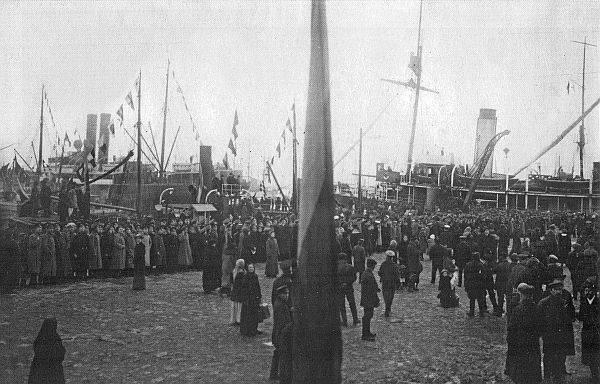
OPENING. CHARK FOR TEAM
According to the presentation of the Chief Naval Staff approved by the Admiralty and the report of the Marine Minister S. A. Voevodsky on August 31 1910, it was decided to "establish a Hydrographic Expedition to study the Arctic Ocean from the Bering Strait to the mouths of the Lena River". During the first three years of the expedition’s work, the Taimyr and Vaigach transports carried out a detailed hydrographic inventory of a vast territory, from Cape Dezhnev to the Lena estuary, and in many places along the coast, hydrographs installed navigation signs.
Of course, our hero wanted to take part in the expedition. By this time, he had been serving on the Baltic warships. fleet, the hydrographic department of the Nikolaev Maritime Academy, and most importantly - the love of navigational affairs and the sea. But he was categorically against ... father. About this, in particular, the mother of the researcher V.P. Vilkitskaya wrote in a letter to I.K. Grigorovich on December 28, 1914 (during the wintering of the expedition): "The deceased husband was opposed to Boris participating in this expedition as the ship’s commander, motivating that he, as a father, would be uncomfortable too zealously to search for an expedition, if, God forbid, this will be necessary. "8
But father died ...
7 April 1913 was appointed Vilkitsky as commander of the "Taimyr" and assistant expedition leader, and on July 20 he replaced the seriously ill expedition leader I. S. Sergeev.
The chronicle of the last in the twentieth century, the great geographical discovery fit into several lines. But how many labors of whole generations of polar researchers stood behind him!
26 June 1913 of the year. Taimyr and Vaigach left Vladivostok.
24 July. Transports dispersed for the reconnaissance of ice conditions.
7 August. The crew of the "Taimyr" discovered to the east of the island of New Siberia a previously unknown island, known as the Island of General Vilkitsky (in honor of Vilkitsky Sr.).
19 August. "Taimyr" and "Vaigach" reached Cape Chelyuskin, but could not approach it because of the continuous ice that stood near the coast.
20 August. Boris Vilkitsky made a bold decision to bypass the ice from the north. It was not possible to find a passage to the west, but this maneuver unexpectedly led to the largest geographical discovery.
It was on this day that another unknown island was discovered, which later became known as the island of Tsarevich Alexei. And in the early morning of the next day, 21 of August, the sailors saw high steep shores of a new, previously unknown land (on modern maps - the island of the October Revolution).
22 August. Around noon, the vessels met in a small cove near a low, flat cape, named after the zoologist and geographer L. S. Berg. Vilkitsky himself noted in the report on this event: "At 6 hours of the afternoon of August 22 I announced to the assembled crews of the expedition ships that the newly discovered land had joined the Imperial Majesty’s possessions and congratulated the team on the discovery, after which the national flag was hoisted on the mast at the shouts of" Hurray " On this day, the team received a pot that it does not usually receive in the Arctic Ocean, and an improved dinner was made. "9.
There is a version that the expedition leader and officers wanted to give the newly discovered land the name Tayway (in honor of "Taimyr" and "Vaigach"). This version hastened to replicate the Vladivostok newspaper "Distant suburbs" after the arrival of transports from the historic voyage. But Vilkitsky himself, in a report made in Vladivostok, denied the newspaper men: "... it may seem strange that, reporting on its [new land] discovery, I did not name it by any name, but the fact is that although geographical traditions and keep the lands for the names that are given by people who saw them for the first time, but not always and not by all the names can be disposed of by travelers without permission. They will receive the name when the report on them, along with the map, is submitted to the Imperial Majesty sobla ovolit approve their new possessions a name that befits them "10.
By order of the Minister of Marine from 23 in January 1914 N N 14, in accordance with the Highest order of 19 in January 1914, the island (the exact outlines of which were not known; a comprehensive study of the archipelago will be carried out in 1930 - 1932 in the Soviet North-Earth expedition led by G. A. Ushakov) was named the Land of Emperor Nicholas II.
After 12 years, by decree of the Presidium of the All-Russian Central Executive Committee, the Land of Emperor Nicholas II was renamed to Northern Earth, and the island of Cesarevich Alexei to Little Taimyr.
And Boris Andreyevich Vilkitsky 20 in March 1914 was enrolled in the suite of His Majesty. IK Grigorovich wrote about this: "As a reward for ... works and the impossibility of giving him neither a rank nor orders, he was made an aide-de-camp, and I can say that of all the naval officers who carry this title .. This is the only pure as crystal man, far from intrigue and desire to make a career, he remains as he was - the ideological and honest worker "11.
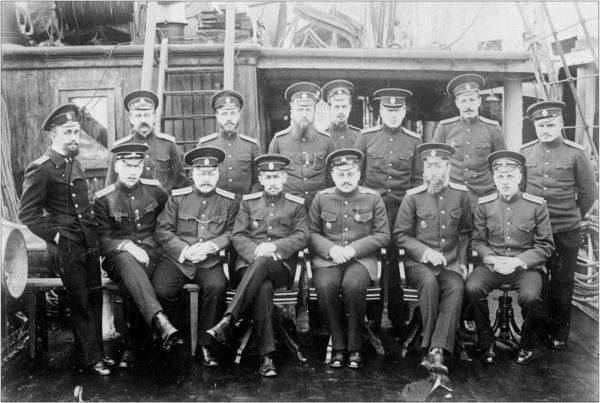
REVOLUTION. BULLET FROM THE SALMONS
In 1917, Boris Andreevich was honored with one of the highest military awards of the Russian Empire - Georgievsky weapons. The commander of the Baltic Sea Fleet presented Vilkitsky, from November 1915 - the commander of the destroyer "Letun" (one of the famous "Novikov") to the award for participation in the minefield on the night from 4 to 5 in October 1916, behind enemy lines, at Cape Steinort in the eastern part of the Baltic. In the submission, it was especially noted that the Russian ships "... at the time of staging dispersed at close range with the enemy destroyers" 12.
And after the February revolution of 1917, the "democratization" (and in fact, the collapse) of the armed forces began. 10 April 1917. The crew and the ship’s ship’s committee adopted a resolution of no confidence in their commander. It said: "Captain 1go rank Vilkitsky committee and the team on the ship will not be accepted, because, firstly: the practice of sailing the destroyer in combat life found out his unfamiliarity with the practical methods of command and control of the ship, as evidenced by that in the difficult and crucial moments of the life of the ship, its management passed into the hands of either the division commander or the closest assistants of the commander, which is confirmed by the officers floating with him ... Secondly: the need for the aforementioned head officer now e occurs due to the fact that now there is a team of selected and approved by the commander of the fleet commander ... "13.
During the mass killings of officers by their own sailors, which took place in Kronstadt in February - March 1917, Vilkitsky was also in danger. According to the memoirs of his wife, he was shot from the shore, and a bullet pierced his overcoat.
He did not consider it possible to cooperate with the new government that came to 1917 in October ...
Boris Andreyevich took part in the White movement in the North of Russia. He managed to continue the work of his expedition in 1918 - 1919. (true, on a much smaller scale - only in the western sector of the Arctic). In the winter of 1920, being already a rear admiral, B.A. Vilkitsky left Russia with the units of the White Army, leaving Arkhangelsk ...
The first time a white emigrant Vilkitsky lived in Norway, in an internment camp near Trondheim. A few days later he received a telegram from Arkhangelsk: a proposal to return to continue work on the study of the Arctic seas. He refused. Later, L. B. Krasin (in 1920-1923 - semi-official plenipotentiary and trade representative of the RSFSR, and then the USSR in the UK) twice sent him his "emissaries" with a proposal for cooperation ...
In the end, Vilkitsky agreed. He himself wrote about it this way: "... I decided that my patriotic duty was to accept their proposal to take the lead of the expedition to go to Siberia and make personal reconnaissance, and if favorable data were confirmed, switch to further work in Russia to overcome Bolshevism "15.
In 1923-1924 Vilkitsky headed the 3 and 4 Kara expeditions, during which export-import traffic was established between the ports of Western Europe and areas of Western Siberia and the beginning of the annual operation of the Kara Sea Route. But, a convinced monarchist, he very quickly understood: his hope for the imminent collapse of Soviet power is elusive.
He returned to France and switched to the poultry industry ...
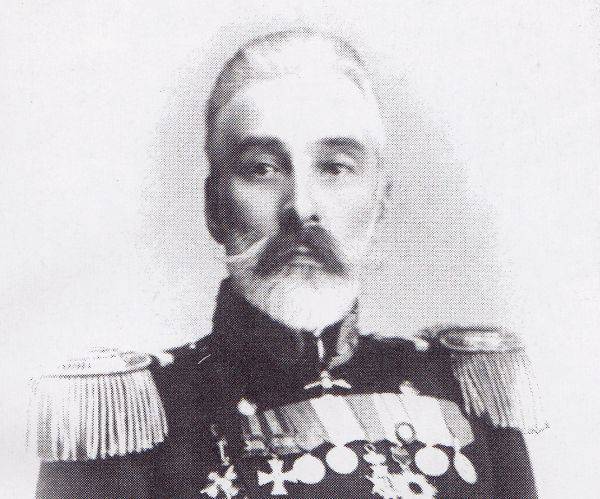
EMIGRATION. "WHEN I'LL COME BACK..."
Little is known about B.Vilkitsky's family life. He was married to the daughter of General Nadezhda Valerianovna Tikhmeneva, they had two children - Tatiana (born in 1913) and son Andrey (1916-1943). During the Civil War, N. V. Tikhmeneva served in the headquarters of the commander of the Armed Forces of Southern Russia. In 1920, the children were evacuated from Novorossiysk with them and at first lived in Lausanne. In emigration, her marriage with Vilkitsky fell apart ...
Of course, the sea and naval service called him. He also had a long and difficult expedition to the Congo in 1928 - 1931, which DI Daragan recalled: “The summer spent by Vilkitsky in the Congo severely undermined his health. He could not do anything serious on polar issues, and he had to work not out of ideological motives in his field of interest, but for his daily bread ... The work, accounting and statistical, in which Vilkitsky was engaged, was not given much, and I know how his father’s friends with great connections in Sweden tried to get for Vilkitsky any retirement ... "
In the last years of his life, Boris Andreevich worked as a clerk in an ink factory ...
“He lived alone, and he was often overpowered by nostalgia,” wrote publicist I. Kuksin. “They especially intensified after he met with a delegation of Soviet polar explorers in the second half of 50’s, in Brussels. when he learned that his name was not forgotten in his homeland! In a conversation with the head of the Main Directorate of the Northern Sea Route, Rear Admiral V. F. Burkhanov, Vilkitsky stated that he would gladly return ... "16. But life decided differently ...
Boris Andreevich died in the Russian Home for the Elderly on the outskirts of Brussels 6 March 1961. In 1996, the ashes of the admiral were transported to Antwerp and from there on the ship "Maria Buango" delivered to St. Petersburg. At the Smolensk cemetery, in the Vilkitsky family grave, the great polar explorer of the 20th century found eternal peace.
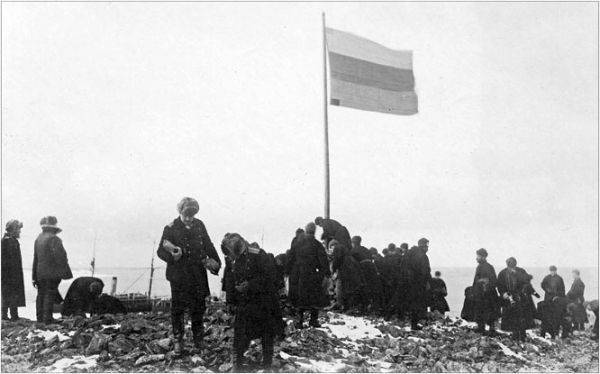
And still there was a case
An interesting detail characterizing the personality of Boris Andreevich was noted in his memoirs by DI Daragan. “I remember such a picture well: a group of officers, including Vilkitsky, went from the Chinese city to the port. The Japanese shelling started and the shells lay quite close to us. When we passed some fanzy where a chicken with chickens was grabbing grain in the middle the projectile exploded close to the courtyard, and Vilkitsky suddenly rushes into the Chinese courtyard. We do not understand anything, but he immediately returns and, with a confused smile, says: "It was necessary to drive the hens away, they could have killed them."
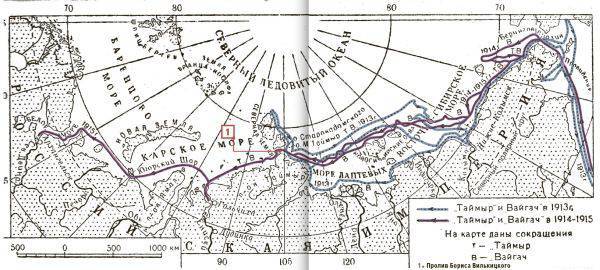
NAMES ON THE MAP
The strait between the Taimyr Peninsula and the Land of Emperor Nicholas II 8 in May 1916 of the year was called the Strait of Tsarevich Alexei. But this name was never used on geographical maps, and since 1929, the strait has borne the name of Boris Vilkitsky. In 1935, this name was legalized by a resolution of the CEC “On Common Geographical Names of the Soviet Arctic”. In 1950, the name “chopped off”, removing the name “white emigrant” and leaving only the last name. Through the efforts of military sailors, hydrographs, historical justice was restored only in 2004.
In 1919, the name of B. A. Vilkitsky R. Amundsen named the islands in the gulf of Theresa Klavenes (Laptev Sea, Taimyr Peninsula). The name Vilkitsky Sr. is carried in seven different geographical locations in the Arctic.
FIGHTING AND SCIENTIFIC AWARDS
For participation in the Russian-Japanese war:
Order of St. Stanislav III degree with swords and bow (November 29 1904);
Order of St. Vladimir IV degree with swords and bow (January 10 1905);
Order of St. Anne IV degree with the inscription "For courage" (December 12 1905 g.);
silver medal in memory of the Russo-Japanese War 1904-1905 (1906 g.);
Order of St. Anne III degree with swords and bow (March 19 1907);
badge for defenders of Port Arthur fortress (1914).
For the works on the study of the Arctic:
Order of St. Anne II degree (December 6 1914 g.);
a gift with a Menzelian image of the Supreme Name (October 19 1915)
a sign in commemoration of the Arctic Ocean Hydrographic Expedition (established 12 on November 1915);
Gold Medal of the Swedish Society of Anthropology and Ethnography (1926).
For participation in the First World War:
Georgievskiye weapon (1917 g.)
1. Starokadomsky L.M. Five sailing in the Arctic Ocean 1910-1915. M., 1953. C. 322-323.
2. Dates relating to the period before 1918 are listed according to the Julian (old) style. After 1918, according to the Gregorian (new) style.
3. Mordovin K. In memory of Andrei Ippolitovich Vilkitsky (memories and impressions). SPb., 1913. C. 1.
4. Daragan D. In memory of Boris Andreyevich Vilkitsky // Sea Notes. 1961. N 3-4. C. 55. At B.A. Vilkitsky was one older sister, Vera (born in 1884). The younger sister Lydia was born in 1887. Brother Boris - Yuri was born in 1888. According to family tradition, he entered the Marine Corps, but died in 1905, being a cadet.
5. Russian State Archive of the Navy (RSA Navy). F. 701. Op. 1. D. 40. L. 117-118
6. RGA Navy. F. 763. Op. 1. D. 201. L. 167.
7. RGA Navy. F. 873. Op. 3. D. 189. L. 1ob.
8. RGA Navy. F. 701. Op. 1. D. 40. L. 109-110.
9. Navigation of the Arctic Ocean Hydrographic Expedition in 1913. I. Communication made by 2-rank captain B.A. Vilkitsky in the Maritime Assembly. [Vladivostok, 1913]. C. 6.
10. Ibid. S. 11.
11. Grigorovich I.K. Memories of the former Navy Minister. Kronstadt-M., 2005. C. 84.
12. Kuznetsov V.V. "... He discovered new lands, which he described." To the 95 anniversary of the discovery of the Land of Emperor Nicholas II // New Watch. 2010. N 19-20. C. 203.
13. RGA Navy. F. 418. Op. 1. D. 544. LL 1, 2. Quoted by: Bogdanov K.A. Under the admiralty spitz. L., 1989. C. 65.
14. Ronin V. "Russian Congo" 1870-1970. Book-memorial. Tom 1. M., 2009. C. 118.
15. Vilkitsky B. When, how and to whom I served under the Bolsheviks. Memories of the White Guard Rear Admiral. Arkhangelsk, 2001. C. 28.
16. Kuksin I. Hydrographs Vilkitsky / / Neva. 2005. N 8.
Information